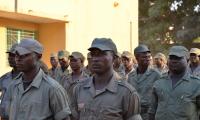Africa takes steps to improve police arrest and detention conditions

The African Commission on Human and Peoples’ Rights has adopted guidelines on conditions of arrest, police custody and pre-trial detention. This marks a step towards better conditions for Africans in their meeting with law enforcement. The important work has been spearheaded by the African Policing and Civilian Oversight Forum and the Special Rapporteur for Prisons and Detentions in Africa with support from the Danish Institute for Human Rights.
- We are extremely exited that the Commission has adopted these guidelines. They are an important step towards better police standards all over Africa, Lisbet Ilkjær, department director at the Danish Institute explains.
The guidelines provide thorough, hands on descriptions of how to act during arrest and custody among other scenarios. The guidelines give very clear instructions on how correctly to inform arrestees about their rights, how to conduct interrogation and right to legal aid.
Although not binding for police services on the African continent, the guidelines have been developed in close cooperation with local law enforcement. Similarly, the guidelines are based on the everyday experiences of police and public in African countries.
- It is true, that these guidelines are not binding for police. But we would not have been able to come this far without commitment and interest from law enforcement from the Continent. Of course, our hope is that the police will integrate these guidelines in their work. This is also why the institute has established a platform for police and human rights with police services from Burkina Faso, Mali and Niger. The drive to use the guidelines must come from within,Ms. Ilkjær said.
The guidelines were adopted on 8 May 2014 during the 55th Ordinary Session of the African Comission on Human and Peoples’ Rights in Angola.
The Guidelines are relevant to several of the institute’s focus countries: Burkina Faso, Mali, Niger, Zimbabwe, Zambia, Tunisia, Egypt and Libya.
